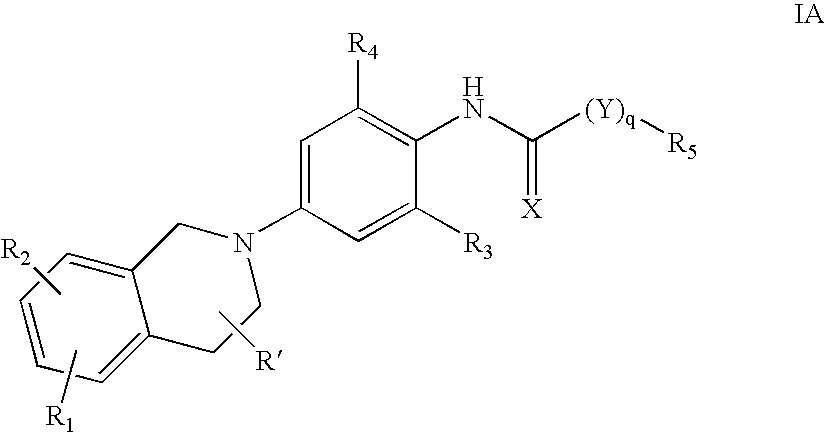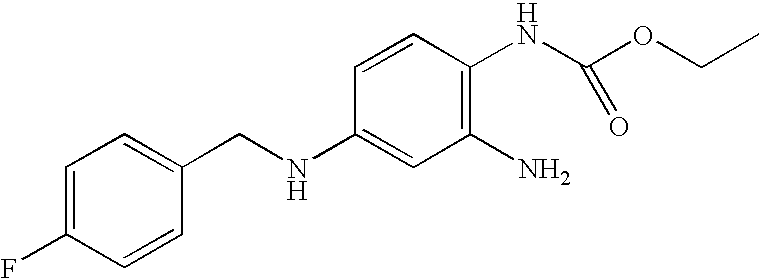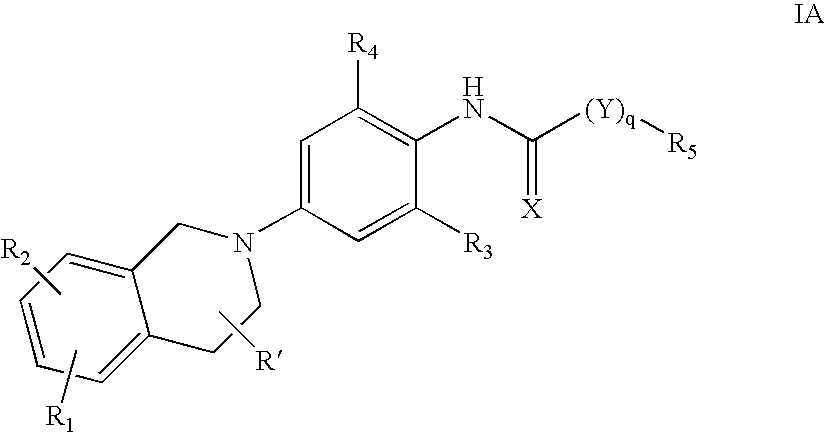Derivatives of 4-(n-azacycloalkyl) anilides as potassium channel modulators
a technology of azacycloalkyl anilide and derivatives, which is applied in the field of derivatives of azacycloalkyl anilide as potassium channel modulator, can solve the problem of narrowing the options of the compound
- Summary
- Abstract
- Description
- Claims
- Application Information
AI Technical Summary
Benefits of technology
Problems solved by technology
Method used
Image
Examples
example 1
N-(2-chloro-4-(3,4-dihydroisoquinolin-2(1H)-yl)-6-(trifluoromethyl)phenyl)-3,3-dimethylbutanamide
Step A: 4-bromo-2-chloro-6-(trifluoromethyl)aniline
[0346]
[0347]N-bromo succinimide (910 mg, 5.1 mmol) was added to a solution of 2-chloro-6-(trifluoromethyl)aniline (1.0 g, 5.1 mmol) and acetic acid (3 mL) in acetonitrile (10 mL) at room temperature. The mixture was heated at reflux, with stirring, for 18 h. The reaction mixture was then filtered through Celite and concentrated to give the title compound, which was used in the next step without further purification.
Step B: N-(4-bromo-2-chloro-6-(trifluoromethyl)phenyl)-3,3-dimethylbutanamide
[0348]
[0349]3,3-Dimethylbutanoyl chloride (1.08 g, 8.0 mmol) was added to a solution of 4-bromo-2-chloro-6-(trifluoromethyl)aniline (2.0 g, 7.3 mmol) in acetonitrile (10 mL). The reaction mixture was stirred at room temperature overnight. Water was added, and the mixture was then extracted with ethyl acetate. The organic layer was dried over sodium su...
example 2
N-(4-(3,4-dihydroisoquinolin-2(1H)-yl)-2,6-dimethylphenyl)-3,3-dimethyl butanamide
Step A: N-(4-Bromo-2,6-dimethyl-phenyl)-3,3-dimethyl-butanamide
[0353]
[0354]3,3-Dimethylbutanoyl chloride (3.37 g, 3.5 mL, 25 mmol) and triethylamine (2.53 g, 3.5 mL, 25 mmol) were added to a solution of 4-bromo-2,6-dimethyl-phenylamine (5.0 g, 25 mmol) in acetonitrile (30 mL). The reaction mixture was stirred at room temperature for 4 hours. Water was added to the mixture, and the precipitate which formed was collected to give the title compound as a powder (7.46 g, 100% yield).
Step B: N-(4-(3,4-dihydroisoquinolin-2(1H)-yl)-2,6-dimethylphenyl)-3,3-dimethylbutanamide
[0355]
[0356]Bis(dibenzylidineacetone)palladium (2 mg, 0.0035 mmol) and (2′-dicyclohexyl phosphanyl-biphenyl-2-yl)-dimethylamine (3.3 mg, 0.0084 mmol) were added to dry toluene (10 mL purged with argon) and stirred for 15 minutes under argon. Potassium tert-butoxide (150 mg, 1.34 mmol), 1,2,3,4-tetrahydroisoquinoline (107 mg, 0.8 mmol) and N-...
example 3
N-(2-chloro-4-(3,4-dihydroisoquinolin-2(1H)-yl)-6-(trifluoromethyl)phenyl)-3-cyclopentyl propanamide
Step A: 4-bromo-2-chloro-6-(trifluoromethyl)aniline
[0358]
[0359]N-bromosuccinimide (910 mg, 5.1 mmol) was added to a solution of 2-chloro-6-(trifluoromethyl)aniline (1.0 g, 5.1 mmol) and acetic acid (3 mL) in acetonitrile (10 mL) at room temperature. The mixture was stirred at reflux for 18 h. The reaction mixture was then filtered through Celite and concentrated to give the title compound, which was used in the next step without further purification.
Step B: N-(4-Bromo-2-chloro-6-trifluoromethyl-phenyl)-3-cyclopentyl-propionamide
[0360]
[0361]3-Cyclopentyl propionyl chloride (1.28 g, 8.0 mmol) was added to a solution of 4-bromo-2-chloro-6-(trifluoromethyl)aniline (2.0 g, 7.3 mmol) in acetonitrile (10 mL). The reaction mixture was stirred at room temperature overnight. Water was added, and the mixture was then extracted with ethyl acetate. The organic layer was dried over sodium sulfate a...
PUM
| Property | Measurement | Unit |
|---|---|---|
| Mass | aaaaa | aaaaa |
| Mass flow rate | aaaaa | aaaaa |
| Cell angle | aaaaa | aaaaa |
Abstract
Description
Claims
Application Information
 Login to View More
Login to View More - R&D
- Intellectual Property
- Life Sciences
- Materials
- Tech Scout
- Unparalleled Data Quality
- Higher Quality Content
- 60% Fewer Hallucinations
Browse by: Latest US Patents, China's latest patents, Technical Efficacy Thesaurus, Application Domain, Technology Topic, Popular Technical Reports.
© 2025 PatSnap. All rights reserved.Legal|Privacy policy|Modern Slavery Act Transparency Statement|Sitemap|About US| Contact US: help@patsnap.com



